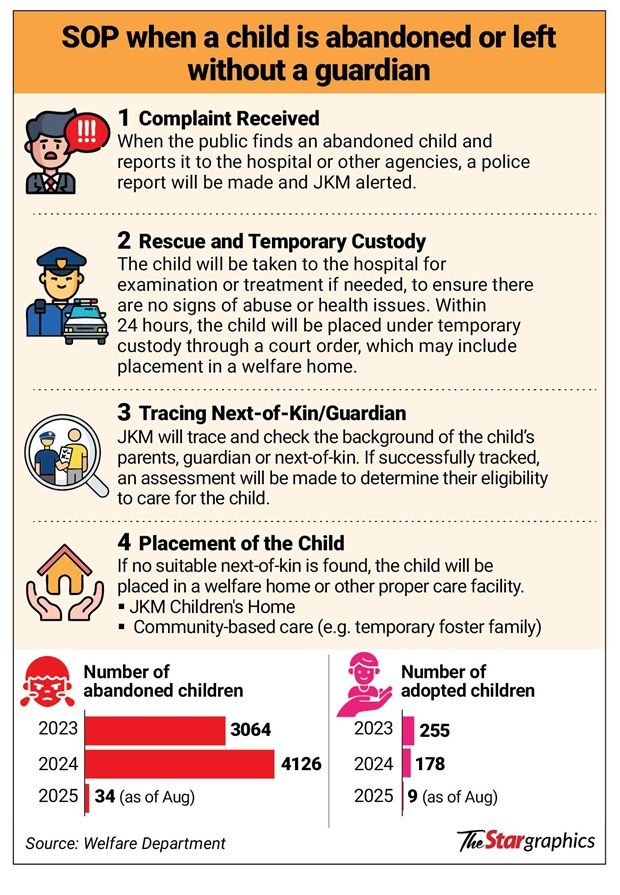August 22, 2025
PETALING JAYA – Just like a flower, I’m growing wild;
No mommy’s kisses and no daddy’s smile;
Nobody wants me, I’m nobody’s child.
Those are the lyrics of the song Nobody’s Child, sung by Hank Snow in the late 1940s and made famous by Karen Young and the Beatles in the 60s.

GRAPHICS: THE STAR
Today, those words ring true for many abandoned children in the country. No one seems to want them.
In 2024, only around 4% (178) of 4,126 abandoned children were adopted, a 50% drop from 2023 when 8% out of 3,064 children were adopted, the Welfare Department (JKM) has revealed.
ALSO READ: The stark reality of abandoned children
This year, only nine have been adopted, said the department’s director-general Datuk Che Murad Sayang Ramjan.
One of the main challenges, he said, is the absence of a birth certificate if they are not legally registered by their parents.
Without information about their parents or next of kin, it is difficult to determine who has legal custody, raising legal issues in matters of custody, adoption, or relocation.
“This also leads to an unclear citizenship status. These children, whose parents are unidentified or are immigrants, are at risk of becoming stateless.
“Without a birth certificate or MyKid/MyKad, it is difficult for them to access public services such as education and healthcare. So, the children drop out of the formal education system.
“Abandoned children of unknown origin also face social stigma or often face discrimination.
“They face risks of abuse and exploitation, physical/emotional abuse or sexual or labour exploitation. They can even becomes victims of human trafficking,” he said.
In order to ensure the fundamental right of children to grow up in a safe and stable family environment, tracing their parents or guardians remains important, which is why JKM issues notices to search for them.
The notice, Che Murad said, allow authorities to assess whether the relatives are fit to care for the child.
In addition, tracing the kin also assists in verifying the identity and citizenship status of the child, which is essential for access to education, healthcare and legal protection, he said.
“More importantly, it saves the children from being permanently placed in welfare institutions which may affect their psychosocial development,” he said.
Che Murad said the Women, Family and Community Development Ministry, through JKM, plays an important role in protecting these children by providing physical support such as safe shelter and basic amenities.
“Their educational needs are also cared for through placement in institutions that provide formal learning opportunities and vocational skills.
“There are also counselling services, psychological therapy and intervention programmes to help them recover from trauma and build self-confidence.
Last year, lawmakers unanimously approved the Constitution (Amendment) Bill 2024.
The age limit for citizenship applications has been reduced from 21 to 18, which many nonprofit organisations said will affect stateless children.
Under the amendment, any newborn child found abandoned in any place will be presumed, until proven otherwise, to have been born in that location and that the mother is a citizen.
However, the law has yet to be gazetted.

